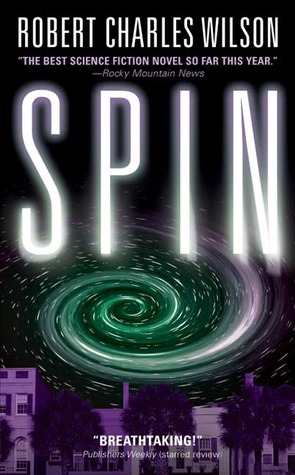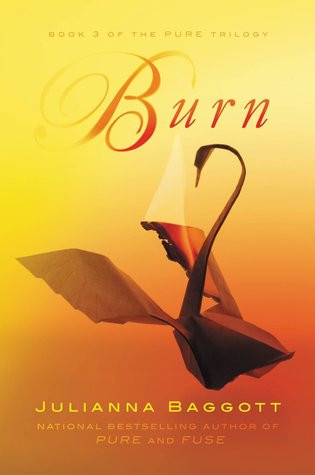The first thing I will say is this: Ruins, despite its bleak title, had possibly the happiest ending in a YA dystopian trilogy that I remember reading in quite some time, and, admittedly, I was kind of relieved.
I was getting the sense that many YA authors have been under pressure from publishers — and their own ambition — to write ‘shocking’ or ‘original’ endings, so they’ve been steered away from neat resolution and feel-goods. But an ending can be positive without being trite, you know? And my feels can only take a beating for so long. So while I won’t get into specifics here, I’ll just re-iterate that it was bizarrely refreshing for Dan Wells to give us a hopeful ending in this trilogy; the main conflict seemed to be headed in a productive direction, and the love triangle (yes, of course) was resolved in as mature of a fashion as I’ve ever read.
I’ve always felt that “The Partials Sequence” has been an underrated YA trilogy. The world-building is solid and sits right in that neat pocket of believable near-future sci-fi that personally grabs me, and the characterization remained consistent across the trilogy — in a good way — these people weren’t static; their actions seemed in line with their motivations, personalities, and goals. The action and tension slowly and consistently ramped up but never became wildly unrealistic, and while Kira, as a heroine, suffers a little bit from a Messiah complex, the supporting characters are diverse enough to keep the story grounded.
While I liked the trilogy overall a lot and was satisfied with the final conclusion, I did have some issues with this particular book. It’s hard to discuss some of them without getting a bit specific, so if you’re wary of spoiling yourself avoid the rest of this paragraph. I briefly mentioned my first issue above, which is that Kira kind of consistently performs above her grade-level, so to speak? I have tried to pledge myself to never use the term Mary Sue (and there I’ve just invoked it, so ugh) because I think it’s so overused that it doesn’t mean anything at this point (see also: “hipster”), but it’s difficult to justify a teenager of above-average but not exceptional intelligence being able to solve two world-changing medical problems that have had preeminent experts scratching their heads for decades. Which isn’t to say that the problems were real stumpers, since as a reader I figured out at least the second one — the one that is solved in Ruins – ages before everyone else did, but still. One of the many geniuses in the book should have caught on before Kira did. Even that would have been easier to accept if she weren’t always on all of these “I’m the only one who can do this” missions, of which there are at least 2 in every standalone novel, I’m sure.
I also think that, in an issue nearly identical to one in probably every YA trilogy closer I’ve read in the last five years, this volume could have benefited from some editing. There are extended passages where Kira and/or other characters are wandering around some landscape feature, and while these journey sequences have compelling moments, they could have been clipped or condensed quite a bit without sacrificing the significance of the outcome.
All in all, those issues aside, I still thought this series collectively finishes on top of many of its more popular contemporaries, or at least many of the ones I’ve read. I’m not going to clamor for it to be optioned for a film because I think Hollywood definitely needs to stop banging on the corpse of YA dystopia for awhile, but the series is still certainly worth a read (the original entertainment!)
I was getting the sense that many YA authors have been under pressure from publishers — and their own ambition — to write ‘shocking’ or ‘original’ endings, so they’ve been steered away from neat resolution and feel-goods. But an ending can be positive without being trite, you know? And my feels can only take a beating for so long. So while I won’t get into specifics here, I’ll just re-iterate that it was bizarrely refreshing for Dan Wells to give us a hopeful ending in this trilogy; the main conflict seemed to be headed in a productive direction, and the love triangle (yes, of course) was resolved in as mature of a fashion as I’ve ever read.
I’ve always felt that “The Partials Sequence” has been an underrated YA trilogy. The world-building is solid and sits right in that neat pocket of believable near-future sci-fi that personally grabs me, and the characterization remained consistent across the trilogy — in a good way — these people weren’t static; their actions seemed in line with their motivations, personalities, and goals. The action and tension slowly and consistently ramped up but never became wildly unrealistic, and while Kira, as a heroine, suffers a little bit from a Messiah complex, the supporting characters are diverse enough to keep the story grounded.
While I liked the trilogy overall a lot and was satisfied with the final conclusion, I did have some issues with this particular book. It’s hard to discuss some of them without getting a bit specific, so if you’re wary of spoiling yourself avoid the rest of this paragraph. I briefly mentioned my first issue above, which is that Kira kind of consistently performs above her grade-level, so to speak? I have tried to pledge myself to never use the term Mary Sue (and there I’ve just invoked it, so ugh) because I think it’s so overused that it doesn’t mean anything at this point (see also: “hipster”), but it’s difficult to justify a teenager of above-average but not exceptional intelligence being able to solve two world-changing medical problems that have had preeminent experts scratching their heads for decades. Which isn’t to say that the problems were real stumpers, since as a reader I figured out at least the second one — the one that is solved in Ruins – ages before everyone else did, but still. One of the many geniuses in the book should have caught on before Kira did. Even that would have been easier to accept if she weren’t always on all of these “I’m the only one who can do this” missions, of which there are at least 2 in every standalone novel, I’m sure.
I also think that, in an issue nearly identical to one in probably every YA trilogy closer I’ve read in the last five years, this volume could have benefited from some editing. There are extended passages where Kira and/or other characters are wandering around some landscape feature, and while these journey sequences have compelling moments, they could have been clipped or condensed quite a bit without sacrificing the significance of the outcome.
All in all, those issues aside, I still thought this series collectively finishes on top of many of its more popular contemporaries, or at least many of the ones I’ve read. I’m not going to clamor for it to be optioned for a film because I think Hollywood definitely needs to stop banging on the corpse of YA dystopia for awhile, but the series is still certainly worth a read (the original entertainment!)






